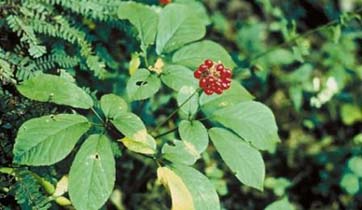DACF Home → Bureaus & Programs → Bureau of Agriculture → Division of Animal and Plant Health → Ginseng
Ginseng Certification
The ginseng certification program facilitates the export of American ginseng (Panax quinquefolius) while meeting the requirements of the Convention for International Trade of Endangered Species of Flora and Fauna (CITES).
On this page:
What is Ginseng?
Ginseng is any part of the plant Panax quinquefolius. Ginseng is a potentially high value crop popularly used in herbal remedies.
For the purposes of licensing and certifying ginseng for sale, ginseng may be considered either wild ginseng or cultivated ginseng.
Wild Ginseng
Wild ginseng is ginseng that was not planted and is growing, living or found in a natural state.
No license, permit or certification will be issued in Maine for the collection of wild ginseng for the purpose of sale or distribution.
In Maine, ginseng is considered state endangered. Harvesting wild ginseng is strongly discouraged because populations in the state are not large or vigorous enough to sustain harvesting, even when seeds from harvested plants are re-planted on the same site. The Maine Natural Areas Program gives ginseng a State Rarity Rank of S3 meaning ginseng has only 20-100 occurences within Maine.
The plant wild sarsaparilla (Aralia nudicaulis) is a common woodland plant in Maine and is frequently confused with ginseng, leading some to believe that ginseng is much more abundant in the state than it actually is.
Cultivated Ginseng
Cultivated ginseng is any part of a ginseng plant that was planted and grown. Cultivated ginseng can be grown in prepared beds or be wild simulated ginseng, grown in a wooded site similar to where ginseng may occur naturally, but where wild ginseng is not established.
In Maine a license is required to grow cultivated ginseng for sale, and certification of the harvested crop is required. Licensing is also required for dealers that buy ginseng for resale.
Ginseng can be a difficult crop to grow in Maine and while a small number of growers are licensed, no harvested ginseng has been certified for sale since 2001. Learn more about growing ginseng
Ginseng Licensing
Two types of ginseng licenses are available, a ginseng grower's license and a ginseng dealer's license.
First time applicants must speak with an inspector to obtain a ginseng license application, contact the Horticulture Program or call 207-287-3891.
No grower's or dealer's license will be issued in Maine for the collection of wild ginseng for the purpose of sale or distribution.
Grower's License
A grower's license is required for persons cultivating ginseng for sale to out-of-state markets. Those applying for a ginseng grower's license for the first time must:
- Have a site visit before planting any ginseng to ensure that the planting site is free of wild ginseng
- Include contact information on the ginseng license application to ensure that inspectors can reach you to schedule a site visit
- Submit application in time to schedule a site visit before September 1. Site visits for any new applications received after September 1 will be conducted after May 1 of the following year when ginseng plants are actively growing
- Submit a ginseng grower's license fee of $10
- Licenses expire on December 31 of each year and must be renewed annually
In addition grower's must also keep for a period of 5 years records of:
- Origin of seed and rootlets for planting
- Location of beds, including site maps
- Planting dates
- Harvesting dates
- Weight of ginseng harvested
- Detailed information of sales transactions
Dealer's License
Persons buying ginseng for resale must have a dealer's license.
- Ginseng dealer's license fees are $25.
- Licenses expire on December 31 of each year and must be renewed annually.
- Dealer's must keep records of transactions.
- Dealer's purchasing foreign ginseng must ensure that it is accompanied by a valid certificate issued by the state or country of origin.
Certifying Harvested Ginseng For Sale
When ready for export the Department weighs the harvested cultivated ginseng and issues an origin certificate. The origin certificate must accompany the shipment to its final sale. The state only certifies cultivated ginseng, wild ginseng will not be certified for sale.
No ginseng grown in Maine has been certified for sale since 2001. The most ginseng harvested and certified in Maine since the ginseng program was implemented in 1995 was 4.54 pounds of ginseng certified in 1998.
Why is Ginseng Regulated?
In Maine wild American ginseng is considered State Endangered.
The Convention for International Trade of Endangered Species (CITES) is an international agreement that ensures the trade of certain wild plants and animals does not threaten the species survival.
As an appendix 2 CITES species, American ginseng is not currently threatened with extinction, but warrants special protection because the harvest of the desirable portion of the plant (the roots) destroys the plant. Regulations have been put in place to ensure the survival of future generations of American ginseng.
